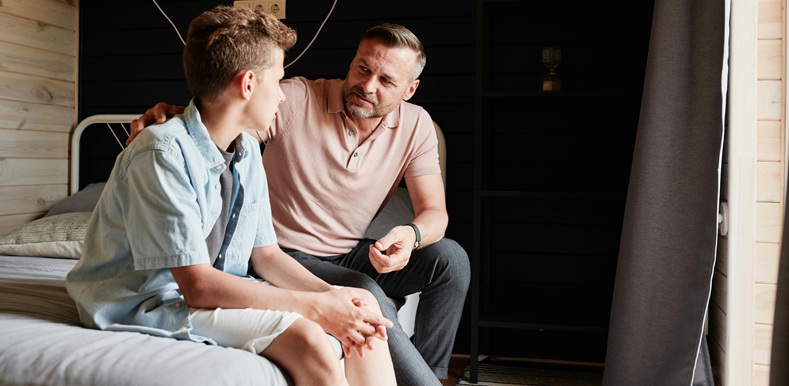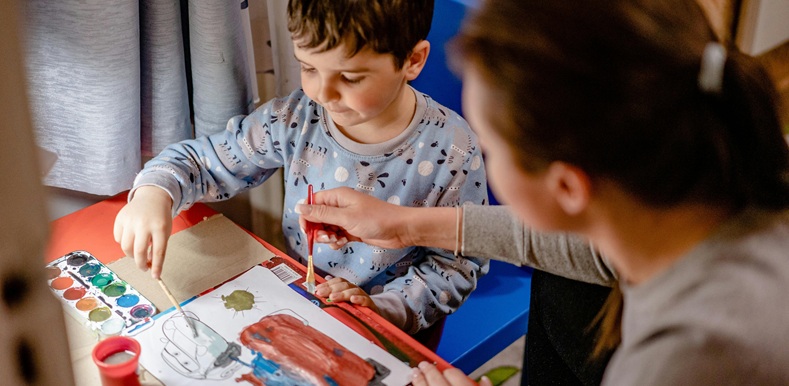Keeping you informed on News and Views within the funeral planning industry
Should Children Go to Funerals?

When a loved one passes away, parents are often faced with a difficult decision about whether they should let children go to the funeral. For many families, this decision stirs emotion and uncertainty. Some believe attending a funeral helps children understand loss and say goodbye, while others worry it could be too distressing or confusing, especially for younger children.
There is no universal rule. Every child processes death differently, and what feels right for one family may not for another. Age, personality, cultural or religious beliefs and the nature of the relationship with the deceased all play a role in deciding whether a child should attend.
To help guide families through this sensitive decision, Justine Dickinson, bereavement counsellor at the Rowland Brothers Foundation, shares her expert insight on how children understand and experience loss at different stages of life, and how parents can support them before, during and after a funeral.
This guide aims to help parents and guardians make an informed, compassionate choice, ensuring that if a child does attend a funeral, the experience feels meaningful, supportive and appropriate for their age and emotional readiness.
Explore This Guide
- How Children Understand Death at Different Ages
- The Benefits of Including Children in Funeral Services
- Potential Concerns and Challenges of Allowing Kids at Funerals
- How to Explain Death and Funerals to Children
- Preparing Children for Their First Funeral Experience
- Supporting Children During the Funeral Service
- When Children Choose Not to Attend
- Practical Considerations for Families
- After the Funeral
- Should Children Attend Funerals?
How Children Understand Death at Different Ages
When deciding whether to bring children to a funeral, it’s important to recognise that every child’s understanding of death evolves with age, experience and emotional maturity. Children don’t all process grief in the same way – their reactions depend on what they can comprehend and how those around them model emotion.
Justine says: “It’s highly individual. Very young children won’t grasp the finality but may pick up the mood. Teens may understand everything and still feel ambivalent about attending. Give clear, age-appropriate explanations and space for questions.”
According to Child Bereavement UK, understanding of death develops gradually through key stages:
- Under 5 years: very young children see death as temporary or reversible, much like sleep or separation. They don’t understand that it’s permanent, but they will notice changes in routine and emotions around them. Keeping explanations simple and reassuring helps them feel secure.
- Ages 5-10: between these ages, children begin to realise that death is final and that it happens to everyone, including themselves and those they love. They may still believe their thoughts or actions can cause death, so adults should listen carefully and gently correct any misunderstandings.
- Older children and teenagers: as they mature, children fully understand that death is permanent and universal. However, they may struggle to manage the strong emotions that come with that awareness. Some want to attend funerals to say goodbye; others prefer distance or distraction – both responses are normal.
This development insight reinforces that there is no single ‘right’ age for a child to attend a funeral. What matters most is giving clear, honest information and allowing the child to make an informed choice supported with sensitivity and care.
The Benefits of Including Children in Funeral Services
Inviting children to a funeral can offer meaningful emotional benefits when approached with care and preparation. Rather than shielding them from sadness, inclusion can help children understand what has happened, express their feelings and begin to accept the reality of loss.
Being part of the funeral gives children a shared space to say goodbye, witness how others express grief and realise that it’s normal to feel sadness or confusion. It can also prevent feelings of exclusion, as children who are kept away from a funeral sometimes feel left out of an important family moment or struggle later to make sense of the loss.
Potential Concerns and Challenges of Allowing Kids at Funerals
While attending a funeral can be a valuable experience for children, it’s understandable that parents may have reservations. Funerals are emotional occasions, and for some children, the atmosphere of sadness and unfamiliar ritual can feel overwhelming.
Common concerns include emotional distress, such as anxiety, fear or confusion, particularly for very young children who may not fully grasp what is happening. Parents may also worry about disruption during the service, if a child becomes restless or upset, or about exposing them to distressing imagery, such as seeing a coffin or hearing others cry.
Justine says: “Consider culture, the child’s temperament and wishes, and what they’ll see. Some children feel strongly about saying goodbye and resent being kept away; others prefer not to go. Informed choice is key.”
These concerns are valid, but most can be eased through gentle preparation and clear communication. Talking through what to expect, explaining that it’s okay to feel sad or step outside if needed, and giving the child a sense of choice all help reduce anxiety. With understanding and reassurance, children are often far more resilient than adults expect.
How to Explain Death and Funerals to Children

When preparing children for a funeral, the most important step is honest, gentle communication. Children are naturally curious, and when adults avoid difficult topics, it can create confusion or fear. Speaking openly about death, in language that matches their age and understanding, helps build trust and emotional security.
Avoid euphemisms like ‘gone to sleep’ or ‘passed away’, which can be confusing or even frightening for younger children who might take them literally. Instead, use clear, calm words such as ‘died’ or ‘has died’. This helps them understand that death is permanent and not something caused by bad behaviour or thoughts.
Explain what they will see and hear at the funeral. Describe what a coffin is, who will be there and what happens during a burial or cremation. This prepares them for the reality of the day and reduces anxiety about the unknown.
It’s also important to stay consistent with your family’s cultural or religious beliefs, explaining what your traditions mean and why certain rituals take place. Encourage children to ask questions and share their thoughts, even if they seem unusual or hard to answer.
Ultimately, honesty delivered with warmth helps children feel safe, respected and included. When adults communicate openly, children are more likely to process grief in healthy ways and feel reassured by the love and support around them.
Preparing Children for Their First Funeral Experience
Attending a funeral for the first time can feel daunting for any child. With careful preparation, however, it can become a calm and meaningful experience rather than a confusing or frightening one. Helping children understand what to expect before, during and after the service is key to reducing anxiety and giving them a sense of control.
Start by explaining the sequence of the day in simple terms – who will be there, what people might say and what usually happens. For example, describe when people arrive, how they sit quietly and that some may cry or share memories. You could also show photos of the venue or a copy of the order of service, so the setting feels familiar.
Agree in advance where your child will sit and who they’ll stay with, ideally beside a trusted adult who can offer reassurance. Let them know it’s okay to take a break or step outside if it feels overwhelming.
Many children appreciate having a small, personal role. They could place a flower, draw a card or read a few words if they wish. These small acts provide comfort and a sense of contribution to the farewell.
Justine adds: “Preview the day step-by-step – where you enter, who speaks, whether curtains close or the coffin remains. Familiarity reduces fear.”
By walking children through the day and involving them in gentle choice, you transform uncertainty into reassurance. Familiarity gives them confidence and helps the funeral become not just an ending, but a supportive moment of understanding and connection.
Supporting Children During the Funeral Service
On the day itself, a little forethought can make a big difference to how children experience a funeral. Even with preparation, emotions can surface unexpectedly, so it’s important that adults remain calm, reassuring and flexible through the service.
Here are a few simple ways to offer support:
- Sit near an aisle or exit: it’ll be easier to step outside quietly if a child becomes unsettled.
- Have a support plan: such as a familiar adult who can accompany them out for a break, or a small comfort item such as a soft toy or photo to hold.
- Reassure them that all feelings are okay: it’s fine to cry, to sit silently or to feel unsure what to do.
- Watch for signs of overwhelm: such as fidgeting, withdrawal, restlessness or sudden distress, and respond gently.
- Allow short breaks or early departure: stepping out for air doesn’t mean failure – it’s part of caring for their wellbeing.
Encourage quiet participation if they wish, perhaps holding hands during a reading or placing a flower at the end. Every child will react differently, and that’s entirely normal. With sensitivity and patience, kids at funerals can feel safe, supported and included, even amidst sadness.
When Children Choose Not to Attend
Sometimes, even after careful discussion and preparation, a child may decide they don’t want to go to the funeral – and that’s okay. Forcing attendance can cause distress or resentment, especially if the child feels unprepared or anxious about what they’ll see. Respecting their wishes shows that their emotions are valid and that they have some control over how they say goodbye.
If a child chooses not to attend, you can still help them mark the loss in meaningful alternative ways, such as:
- Writing a letter or drawing a picture to place in the coffin or give to the family.
- Lighting a candle at home and sharing a few memories together.
- Watching a recording or attending a later memorial, if available, when they feel ready.
- Creating a small memory space at home with photos, flowers or objects that remind them of the person who died.
These gentle rituals help children express love and grief in their own time and way.
Supporting autonomy is a vital part of grief care. Allowing a child to choose whether to attend a funeral prioritises their emotional safety, giving them confidence that their feelings are heard and respected, which, in turn, helps them process loss more healthily in the long term.
Practical Considerations for Families
Alongside the emotional preparation, it’s helpful to think through some practical details when bringing children to a funeral. Small steps can make the day feel calmer and more predictable for everyone involved.
- What children should wear: choose respectful clothing in muted or dark colours, but prioritise comfort. Young children don’t need to dress formally – feeling at ease matters more than appearance.
- Bring essentials: pack tissues, snacks and water to help keep children settled, especially during longer services.
- Plan childcare if needed: if you have very young siblings or babies, consider whether arranging separate care would allow you and other children to participate more peacefully.
- Discuss travel and timing: explain where you’re going, how long it might last and when there will be breaks or time to go home.
Ultimately, comfort and reassurance count far more than formality. A well-prepared child – emotionally and practically – is more likely to find the experience calm, respectful and meaningful.
After the Funeral

Once the funeral has taken place, children may need time to process what they’ve seen and felt. Grief rarely follows a straight path, and every child will react differently. Some might want to talk immediately, while others will reflect quietly to show their feelings through play or behaviour changes.
Encourage gentle follow-up conversations by asking open questions such as ‘What did you think?’ or ‘How did it feel being there?’. This helps them put emotions into words and signals that it’s safe to talk about the person who has died.
It’s also important to normalise varied reactions. Sadness, confusion, numbness or even indifference are all natural responses. Let children know that there’s no ‘right’ way to grieve.
You can support ongoing healing through remembrance activities, like:
- Drawing a picture or writing about a memory
- Visiting a grave or special place
- Creating a small memory box with photos or keepsakes
Some children benefit from talking to a teacher, counsellor or bereavement support service.
Should Children Attend Funerals?
When it comes to deciding whether children should go to funerals, there is no single ‘right’ answer – only what feels right for your child, your family and your circumstances. Every child understands and experiences grief in their own way, and the most supportive approach is one rooted in compassion, honesty and preparation.
By giving children clear explanations, emotional reassurance and a genuine say in whether or how they take part, parents can help them feel included and safe. Whether a child attends the funeral or says goodbye in another way, what matters most is that they feel heard, respected and supported.
At Golden Leaves, we understand that thoughtful preparation extends beyond the day of the funeral itself. Through funeral planning, families can reduce uncertainty, protect loved ones from difficult decisions in moments of grief and create the space to focus on what truly matters – compassion, understanding and peace of mind.












Share this content...